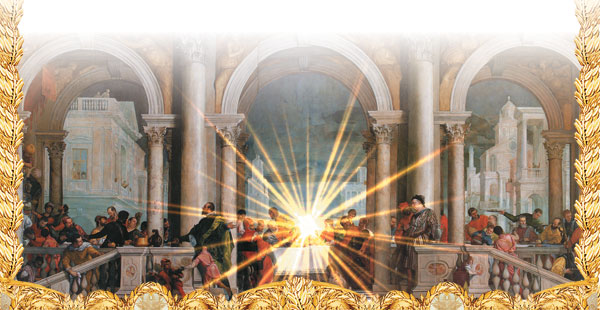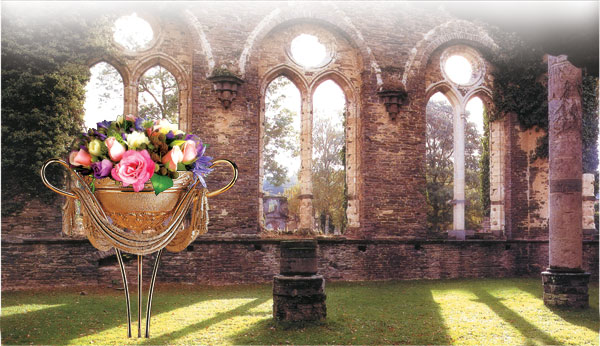The Prophet Jesus (pbuh), one of Allah's chosen people in this life and in the Hereafter, was given the responsibility of calling his people to the right path. Allah portrays him as a person who was very different from the people he met during his life. For example, he was born without a father, his mother Mary had been told by His angels that he would be his people's Messiah, and had many other unique qualities. One of these is mentioned in the Qur'an:
The Messiah, Jesus son of Mary, was only the Messenger of Allah and His Word, which He cast into Mary, and a Spirit from Him. (Surat an-Nisa': 171)
When the angels said: "Mary, your Lord gives you good news of a Word from Him. His name is the Messiah, Jesus son of Mary, of high esteem in this world and the Hereafter, and one of those brought near." (Surah Al 'Imran: 45)
The expression Word of Allah is used only for the Prophet Jesus (pbuh). Allah revealed his name, Jesus Messiah, before he was born. This is just one indication that his creation was different from other people.
Only the Qur'an, which Allah has promised to keep intact and unaltered until the Day of Judgment, gives us accurate information about the Prophet Jesus (pbuh). Allah states in the Qur'an that the Prophet Jesus (pbuh) was not crucified, but rather, he was raised to the heavens. He will return in the End Times, the era preceding the Day of Judgment. Many hadiths testify to these facts.
We will now examine these facts in some detail.
... We have sent down the Book to you making all things clear and as guidance and mercy and good news for the Muslims. (Surat an-Nahl, 89)

The Roman soldiers and Jewish priests who were responsible for arresting the Prophet Jesus (pbuh) claimed that he was crucified and died on the cross. All Christians accept these core beliefs, as well as the belief that he was resurrected and then ascended to the heavens. However, a quite different account is provided in the Qur'an:
… and their saying: "We killed [qatalna] the Messiah, Jesus son of Mary, Messenger of Allah." They did not kill [ma qataloohu] him and they did not crucify [ma salaboohu] him, but it was made to seem so [shubbiha] to them. Those who argue about him are in doubt about it. They have no real knowledge of it, just conjecture. But they certainly did not kill [ma qataloohu] him. (Surat an-Nisa': 157)
Allah raised him [Jesus] up to Himself [rafa'ahu]. Allah is Almighty, All-Wise. (Surat an-Nisa': 158)
The expression was made to seem so reveals that the Prophet Jesus (pbuh) was not martyred, but rather raised to the heavens. Allah states that those who say otherwise have no knowledge of the truth. The people saw someone who looked like the Prophet Jesus (pbuh) die, while, in reality, the Prophet Jesus (pbuh) ascended to the heavens.
An analysis of the words used to narrate the Prophets' deaths and those used to narrate the attempt on the Prophet Jesus' (pbuh) life reveal an important fact. In the first case, the Qur'an uses qatala (to kill), maata (to die), halaka (to perish), salaba (to crucify), and a few other specific words. The Qur'an is very clear and specific about the fact that "They did not kill him [wa ma qataloohu] and did not crucify him [wa ma salaboohu]." People were shown a likeness of the Prophet Jesus (pbuh), who in fact, was taken back by Allah and raised to the heavens:
When Allah said: "Jesus, I will take you back [mutawaffeeka], raise you up [wa raafi`uka] to Me, and purify you of those who disbelieve. And I will place the people who follow you above those who disbelieve until the Day of Resurrection." (Surah Al 'Imran: 55)
In other words, the Prophet Jesus (pbuh) did not experience a normal death. The word tawaffa in the above verse is used in the following ways:

[Jesus said], I said to them nothing but what You ordered me to say: "Worship Allah, my Lord and your Lord." I was a witness against them as long as I remained among them. But when You took me back to You [tawaffaytanee], You were the One watching over them. You are Witness of all things. (Surat al-Ma'ida: 117)
The expression used here comes from the Arabic word wafa, which means the act of taking the self back, not killing or death. In fact, in Arabic commentaries it is not used in the sense of death. The commentary of Islamic scholar al-Qurtubi is one example of this; he used the expression "the taking away of the selves" for the word in question. From the Qur'an again, we understand that "taking the self back" does not necessarily mean death. For instance, this word is also used in another verse to describe the taking back of a person while he or she is asleep:
It is He Who takes you back to Himself [yatawaffaakum] at night, while knowing the things you perpetrate by day, and then wakes you up again, so that a specified term may be fulfilled. (Surat al-An'am: 60)
Allah states that the Prophet Jesus (pbuh) was not martyred or hanged, that people were shown a likeness of him, that He took him back (as happens during sleep), and raised him to the heavens. For all other Prophets, such words as qatala or mawt (death), are used. Thus, we can conclude that the Prophet Jesus (pbuh) was put into a sleep-like state and raised to Allah's Presence, that he did not experience death as we know it, and that he has left our dimension. (Allah knows the truth.)
(For further information on the subject, see The Prophet Jesus (pbuh) Did Not Die by Harun Yahya)
Many verses refer to the Prophet Jesus' (pbuh) second coming. Following are some of them:
1) When Allah said: "Jesus, I will take you back, raise you up to Me, and purify you of those who do not believe. And I will place the people who follow you above those who do not believe until the Day of Resurrection. Then you will all return to Me, and I will judge between you regarding the things about which you differed." (Surah Al 'Imran: 55)
This verse mentions a people who are followers of the Prophet Jesus (pbuh) and who will be above the unbelievers until the Day of Resurrection. Accordingly, there will be people who follow him until the Day of Judgment. Looking at present-day Christians, we see that the core of their religion has been tampered with and is not the same faith preached by the Prophet Jesus (pbuh). For example, they claim that he is Allah's son (Allah forbid) and part of a Trinity (the Father, the Son, and the Holy Spirit). Therefore, by transgressing the limits that Allah established for humanity, today's Christians are far from Allah's true religion and cannot be considered as the Prophet Jesus' (pbuh) followers. The Qur'an states emphatically that those who believe in the Trinity are unbelievers:
Those who say that Allah is the third of three are unbelievers. There is no deity but Allah, [Who is] One. (Surat al-Ma'ida: 73)

Paolo Veronese's "Feast in the House of Levi," an oil painting from 1573. It is on display in Venice's Accademia Museum. This picture from the Italian Renaissance depicts the Prophet Jesus (pbuh) and the Apostles.
(Very few people believed in the Prophet Jesus (pbuh) when he first came to Earth, and the promise revealed in the verse "I will place the people who follow you above those who do not believe until the Day of Resurrection" had not yet come about.) Therefore, those people who follow the Prophet Jesus (pbuh) must appear on his second coming to Earth at a time close to the Last Hour, and they will be raised above the unbelievers until the Day of Judgment.
2) There is not one of the People of the Book who will not believe in him before he dies; and on the Day of Resurrection he will be a witness against them. (Surat an-Nisa': 159)
The him here stands for the Prophet Jesus (pbuh), as the next verses make clear:
… and their saying: "We killed the Messiah, Jesus son of Mary, Messenger of Allah." They did not kill him and they did not crucify him, but it was made to seem so to them. Those who argue about him are in doubt about it. They have no real knowledge of it, just conjecture. But they certainly did not kill him. Allah raised him up to Himself. Allah is Almighty, All-Wise. (Surat an-Nisa': 157-158)
Every person will taste death. Then you will be returned to Us. (Surat al-'Ankabut, 57)
Some scholars interpret before he dies as meaning before the death of the People of the Book (Jews and Christians). In this case, every Jew and Christian would believe in Prophet Jesus (pbuh) before he or she dies. But Arabic linguistics shows that this claim is not correct. The plural suffix hum is used in all those verses of the Qur'an that refer to the People of the Book (as in Surat al-Bayyina 1 and 6, Surat al-Hadid 29, and Surat al-Hashr 2). Yet the singular suffix hu is employed in this verse. This means that the verse reports that the People of the Book will believe in Prophet Jesus (pbuh) before his death – in other words, before his biological death at his second coming. (And Allah knows the truth.)
Besides during the Prophet Jesus' (pbuh) lifetime, the vast majority of the region's Jews refused to believe in him, and some of them even attempted to martyr him. As for those Jews and Christians who lived after the Prophet Jesus (pbuh) was raised to His Presence, they cannot be called his followers for they do not meet the Qur'anic definition of faith and belief.
The expression on the Day of Resurrection he will be a witness against them, indicates again that the Prophet Jesus (pbuh) will come again. These verses conclusively indicate that all People of the Book will believe before the Prophet Jesus (pbuh) dies. The verse refers to the future, because it speaks of the Prophet Jesus' (pbuh) death. Then it mentions that all People of the Book will believe in him, something that has not happened yet.

As we will see in detail in the coming chapters, the People of the Book will see and recognize him, as well as become his Muslim followers while he lives, and the Prophet Jesus (pbuh) will testify about their conduct in the Hereafter. (Allah knows the truth.)
3) His return to Earth is mentioned in other verses, such as those given below:
When an example is made of the son of Mary, your people laugh uproariously. They retort: "Who is better, then, our deities or him?" They only say this to you for argument's sake. They are indeed a disputatious people. He is only a servant on whom We bestowed Our blessing and whom We made an example for the tribe of Israel. If We wished, We could appoint angels in exchange for you to succeed you on Earth. (Surat az-Zukhruf: 57-60)
Allah then refers to him by a specific title, a Sign of the Hour:
He is a Sign of the Hour. Have no doubt about it. But follow me. This is a straight path. (Surat az-Zukhruf: 61)
This verse clearly indicates that the Prophet Jesus (pbuh) will come again, for he lived approximately six centuries before the Qur'anic revelation. Thus, since his first life cannot be understood as a Sign of the Hour for the Day of Judgment, he will return during the End Times, the period immediately preceding that Day. (Allah knows the truth.)
4) Many other verses indicate this miraculous event. Among them are the following:
When the angels said: "Mary, your Lord gives you good news of a Word from Him. His name is the Messiah, Jesus son of Mary, of high esteem in this world and the Hereafter, and one of those brought near. He will speak to people in the cradle and also when fully grown, and will be one of the believers," she asked: "My Lord! How can I have a son when no man has ever touched me?" He said: "It will be so." Allah creates whatever He wills. When He decides on something, He just says to it, "Be!" and it is. He will teach him the Book and Wisdom, and the Torah and the Gospel. (Surah Al 'Imran: 45-48)
But what "Book" will He teach the Prophet Jesus (pbuh)? Allah answers this question in the following verse, where the same expression is used:
Remember when Allah said: "Jesus son of Mary, remember My blessing to you and to your mother when I reinforced you with the Purest Spirit so that you could speak to people in the cradle and when you were fully grown; and when I taught you the Book and Wisdom, and the Torah and the Gospel." (Surat al-Ma'ida: 110)
Do not consider Allah to be unaware of what the wrongdoers do. He is merely deferring them to a Day on which their sight will be transfixed,
(Surah Ibrahim, 42)
When we examine the Book referred to in both verses, we realize that it indicates the Qur'an, the final revealed book sent to humanity. Earlier Books were the Torah and the Bible (the Psalms, revealed to the Prophet David (pbuh), is contained within the Old Testament). Another verse uses Book instead of Qur'an when listing it alongside the Torah and the Gospel:
Allah, there is no deity but Him, the Living, the Self-Sustaining. He has sent down the Book to you with truth, confirming what was there before it. And He sent down the Torah and the Gospel ... (Surah Al 'Imran: 2-3)
Thus, the third book being taught to the Prophet Jesus (pbuh) is the Qur'an. Obviously, since he was raised to Allah's Presence some 600 years before its revelation, he must come again. Our Prophet's (may Allah bless him and grant him peace) hadiths reveal that the Prophet Jesus (pbuh) will rule according to the Qur'an, not the Bible, when he returns. (For more information, see Harun Yahya, Signs of the Last Day [Istanbul: Global Publishing, 2003].) This interpretation fits the meaning of the verse. (Allah knows the truth.)

We have sent down Clear Signs to you
and the example of those who passed away before you and an admonition for those who have taqwa..
(Surat an-Nur, 34)
5) In addition, "The likeness of Jesus in Allah's Sight is the same as Adam" (Surah Al 'Imran: 59) could also be foretelling the Prophet Jesus' (pbuh) return. Scholars point out that both Prophets were created without a father: the Prophet Adam (pbuh) was created from soil by Allah's command Be!; the Prophet Jesus (pbuh) was created without a father by the same Divine command. The Prophet Adam (pbuh) was brought down from the heavens to Earth; perhaps the Prophet Jesus (pbuh) will be brought down from His Presence in the End Times. (Allah knows the truth.) As we have seen, the verses indicating his return are very clear. Moreover, the Qur'an does not use any similar expressions for the other Prophets; they are only used for the Prophet Jesus (pbuh).
6) Another verse referring to the Prophet Jesus' (pbuh) ascension is the following:
[Jesus said:] Peace be upon me the day I was born and the day I die, and the day I am raised up again alive." (Surah Maryam: 33)
This verse, when considered in conjunction with Surah Al 'Imran: 55, signals an important reality: Surah Al 'Imran: 55 speaks of the Prophet Jesus (pbuh) as being taken back to Allah's Presence and does not say that he has died or been martyred. However, Surah Maryam: 33 refers to the day when he will die. This second death is only possible if he lives on Earth once again. (Allah knows the truth.)
Truly Allah has knowledge of the Hour and sends down abundant rain and knows what is in the womb. No one knows what he or she will earn tomorrow and no one knows in what land he or she will die. Allah is All-Knowing, All-Aware.
(Surah Lokman, 34)
7) Another piece of evidence is the word kahlaan, mentioned in the verses below:
Remember when Allah said: "Jesus son of Mary, remember My blessing to you and to your mother when I reinforced you with the Purest Spirit so that you could speak to people in the cradle and when you were fully grown [kahlaan]." (Surat al-Ma'ida: 110)
He will speak to people in the cradle, and also when fully grown [kahlaan], and will be one of the righteous. (Surah Al 'Imran: 46)
This word, which appears only in these two verses and only with regard to the Prophet Jesus (pbuh), describes his adult life between the age 30 and 50. In other words, this represents a period when he is no longer a young man but a wise person on the verge of entering old age. Scholars agree that this word indicates an age greater than 35.
They also suggest, basing their claim on a hadith narrated by Ibn `Abbas, that the Prophet Jesus (pbuh) was raised to Allah's Presence in his early 30s, that he will experience his old age by living for another 40 years after his second coming, and that the above verse is proof for this miraculous event.14

This expression is used in the Qur'an only in regard to the Prophet Jesus (pbuh) because all of the other Prophets that we know about fulfilled their responsibility of calling their people to belief after they had already reached a mature age. In the case of the Prophet Jesus (pbuh), however, it points out a miraculous situation, because the expressions in the cradle and when fully grown highlight the two miraculous times.
At-Tabari, in his work The Commentary of at-Tabari, explains these expressions in the following terms:
These statements (Surat al-Ma'ida 110) indicate that in order to complete his lifespan and speak to people when fully grown, the Prophet Jesus (pbuh) will come down from Heaven. That is because he was raised to Heaven when still young. This verse (Surah Al 'Imran, 46) provides evidence that the Prophet Jesus (pbuh) is living. The Ahl al-Sunnah share this view, because this verse states that he will speak to people when fully grown. He will be able to grow fully only when he returns to Earth from Heaven.15
The interpretations of kahlaan, like all the other information about the Prophet Jesus (pbuh), indicate his miraculous return to Earth in the End Times as well as his efforts to direct people toward true religion. No doubt, this is great news for all believers, a gift and grace from Allah. Thus, believers are responsible for supporting and defending the Prophet Jesus (pbuh) after his second coming in the most appropriate manner and to live by the Qur'an's morality.
The kingdom of the heavens and earth belongs to Allah.
Allah has power over all things.
(Surah Al 'Imran, 189)
In addition to the verses of the Qur'an that impart the glad tidings of the second coming of the Prophet Jesus (pbuh), the hadiths of our Prophet (may Allah bless him and grant him peace) also describe the Prophet Jesus' (pbuh) return to Earth in detail. Accordingly, when the Prophet Jesus (pbuh) returns, he will rule with the Qur'an, free Christians from the erroneous beliefs they have fallen into and lead them toward Islam. He will pray behind Hazrat Mahdi (pbuh), intellectually destroy the dajjal and, together with Hazrat Mahdi (pbuh), cause the moral values of Islam to rule the world. Some of the hadiths on the subject read:
He will rule for forty (40) years with the book of Allah and my Sunna, and then he will die. (Jalaladdin as-Suyuti, al-I'lam Hukm-al Isa, Suleymaniye Library, No. 1446/9; Sami Baybal, The Return of the Messiah in the Abrhamaic Faiths, Yediveren Books, July 2002, p. 238-240)
Jesus [pbuh] will not come to the people of Mohammed as a Prophet, but to practice the religion of Mohammed. (Alusi, al-Jawabu'l Fasih, I, 835; Sami Baybal, The Return of the Messiah in the Abrhamaic Faiths, Yediveren Books, July 2002, p. 238-240)
Jesus (pbuh) will descend and will practice our Prophet's (may Allah bless him and grant him peace) law. (Ebu'l Münteha, Şerhu'l Fıkhu'l Ekber, İstanbul, 1984, p. 31; Sami Baybal, The Return of the Messiah in the Abrhamaic Faiths, Yediveren Books, July 2002, p. 238-240)
He will judge by the law of Mohammed, will adhere to a Prophet even though he is one himself, and will belong to the people of Mohammed. He will be the people of the Prophet, and he will be the most devoted among them … (Baybal, The Return of the Messiah in the Abrhamaic Faiths, Yediveren Books, July 2002, p. 238-240) …accept no other religion but Islam … [In his time] Nothing and nobody but Allah will be worshipped.... (Ruh al-Ma'ani, 7/60)
In the time of the Prophet Jesus (pbuh) and Hazrat Mahdi (pbuh), all weapons will fall silent, all conflicts will end in peace, all disagreements will be resolved and love, friendship and brotherhood will rule the world. This excellent age is described thus in the hadiths:
The (competents of) battle will abandon its load (arms and equipment). (Sunan Ibn Majah, 10/334).
He will do away with enmity and hatred... Earth will be filled with peace, just as a bowl is filled with water. No enmity will remain between anyone. All enmity, conflict, and disagreement will surely vanish. (Sahih Muslim, 1/136)
The venom will be removed from poisonous animals. Even a small boy will place his hand in a serpent's mouth, and the serpent will not harm him. The wolf will be like a dog in a herd of sheep or goats.... In his time, the wolf will play with the sheep and snakes will not harm children. (Sunan Ibn Majah, p. 331-35)
Then Earth will be told to bring forth its fruit and restore its blessing. As a result thereof, there would grow [such a large] pomegranate that a group of people will be able to eat it and seek shelter under its skin. A milk cow will give so much milk that a whole party will able to drink. A milk camel will give such [a large quantity of] milk that the whole tribe will be able to drink out of it, and a milk sheep will give so much milk that the whole family will able to drink out of that (As-Suyuti, Al-Hawi Lil-Fatawi)
... And goods will be so plentiful that nobody will want any more. (Tabari, al-Jam al Bayan, Vol. VI, p. 19)
The works of great and completely trustworthy Islamic scholars such as the Sunan Abu Dawud and the Maktubat of Rabbani make it clear that Allah will send an individual to renew the faith and free it from subsequent additions every century:
Allah will raise for this community AT THE BEGINNING OF EVERY HUNDRED YEARS THE ONE WHO WILL RENOVATE ITS RELIGION FOR IT. (Sunan Abu Dawud, 5/100)
One hadith revealing that Hazrat Mahdi (pbuh) will come in Hijri 1400 has come down from our Prophet (may Allah bless him and grant him peace) as follows:
People will gather around Hazrat Mahdi (pbuh) in the year 1400. (Risalat al-Khuruj al-Mahdi, p. 108)
Within a certain time frame inside this 100-year period the moral values of Islam will rule the whole world and the system of the antichrist that opposes them will be entirely eliminated. However, following this rise, which will last for approximately 100 years, the world will enter a new phase of degeneration, coinciding with the Hijri 1500s. In one hadith narrated by many scholars, including Imam Ahmad ibn Hanbal, a hadith scholar, our Prophet (may Allah bless him and grant him peace) provides important information about the beginning of human history by saying that 5600 years of the life span of the world had passed by his day:
Ahmad Ibn Hanbal transmitted in his 'Ilal: FIVE THOUSAND SIX HUNDRED YEARS HAVE PASSED FROM THIS WORLD. (Al-Muttaqi al-Hindi, Al-Burhan fi Alamat al-Mahdi Akhir az-Zaman, p. 89) Hadiths transmitted from our Prophet (may Allah bless him and grant him peace) reveal that the life span of the Earth will be 7,000 years. Anas Ibn Malik narrates that the Messenger of Allah (may Allah bless him and grant him peace) said: THE LIFE SPAN OF THE WORLD IS SEVEN DAYS IN THE DAYS OF THE HEREAFTER. Almighty Allah has said: ONE DAY IN THE SIGHT OF YOUR LORD IS LIKE A THOUSAND OF YOUR YEARS. ALLAH WILL ASCRIBE THE EQUIVALENT OF GOOD DEEDS OF THE SEVEN THOUSAND YEARS OF THE AGE OF THIS WORLD to the one who meets the need of any of his brothers in the faith on the path of Allah as if he spends his days in fasting and his nights in worship. (Al-Muttaqi al-Hindi, Al-Burhan fi Alamat al-Mahdi Akhir az-Zaman, p. 88)
Narrated from Daqqaq Ibn Zaid Al-Juhani: I told the Messenger of Allah (may Allah bless him and grant him peace) of a dream I had had. In that dream the Messenger of Allah (may Allah bless him and grant him peace) was at the top step of a seven-stepped pulpit. He said: THE SEVEN-STEPPED PULPIT YOU SEE IS THE SEVEN THOUSAND YEARS OF AGE OF THIS WORLD. (Al-Muttaqi al-Hindi, Al-Burhan fi Alamat al-Mahdi Akhir az-Zaman, p. 89)
The life span of the community is one thing and that of the world another. Said Nursi, the greatest mujaddid of the last 1000 years and 1300 (Hegira style), says that Muslims will remain on the true path until a command comes from Allah, and will be victorious until around 1506 with the judgement day probably taking place in 1545 (Allah knows the truth).
"A group from my community will remain in truth until Allah's command [the Judgment Day]."
The abjad calculation of the clause "A group from my community..." which is 1542 (2117) implies its [the community's] time of survival. The abjad calculation of the clause "will remain in truth" (when the gemination mark is counted) gives 1506 (2082); it indicates until that date it will continue its work of enlightenment evidently and obviously, and maybe victoriously; then until 1542 (2117) in secrecy and defeat. The abjad calculation of the clause "until Allah's command" (when the gemination mark is counted) suggests that THE JUDGMENT DAY WILL BEFALL the unbeliever in 1545 (2120). (Kastamonu Addendum, p. 33)
The great Sunni scholar Al-Barzanji states that the life span of the ummah will not exceed the year 1500 (Islamic calendar). (Allah knows the truth.)
THE LIFE OF THIS COMMUNITY WILL EXCEED 1000 YEARS, YET BE LIMITED TO 1500 YEARS... (Al-Barzanji, Al-Isha'ah li-ashrat al-sa'ah, p. 299) Suyuti's statement made on the basis of the hadith handed down from our Prophet (may Allah bless him and grant him peace) is also that the life of the Ummah will not go past the year 1500: THE LIFE OF MY COMMUNITY WILL NOT EXCEED 1500 YEARS. (Jalaladdin As-Suyuti, Al-Kashf 'an Mujawazat Hazihi al-Ummah al-Alf; As-Suyuti, Al-Hawi Lil-Fatawi, 2/248; Ismail Haqqi al-Burusawi, Tafsir Ruh al-Bayan 4/262; Ahmad ibn Hanbal, Kitab al-`Ilal, p. 89)
As is clear from the hadiths of our Prophet (may Allah bless him and grant him peace) and statements by great Islamic scholars, the Hijri 1400s we are living in are the age of the coming of Hazrat Mahdi (pbuh). The Prophet Jesus (pbuh) will return to Earth during this century, Hazrat Mahdi (pbuh) will appear, and the moral values of Islam will rule the world.